ॐ Some time ago a respected mahatma I know said: Vivekananda loved Jesus! He was implying that therefore he---and we---could love Jesus too. This is the foolish, undiscriminating attitude of the Neo-Vedantin that will keep Christianity alive in India even as it dies in Europe and the US.
Anyway, the problem of the historical Jesus is secondary to the greater problem of the imaginary Jesus. Hindus love Jesus---for reasons I will never understand---and Jesus will continue to survive in the Hindu imagination if in no place else on earth!!! -- IS/SDS
Courtesy: Bharatbharati and Ishwar Sharan
How Christianity was used to enslave Europe – Joseph Atwill
Posted on October 21, 2013
 About Joseph Atwill: While studying the two most prominent works of the 1st century –Josephus’ Wars of the Jews and the Gospels – Joseph Atwill noticed a series of parallels occurring in sequence between the military campaign of the Roman Caesar Titus Flavius and the ministry of Jesus. His findings led him to a startling new conclusion about the origins of Christianity – that a Roman imperial family, the Flavians, had created Christianity to pacify the Jews’ rebellion against Rome, and even more incredibly, they had placed a literary satire within the Gospels andWars of the Jews to inform posterity of this fact.
About Joseph Atwill: While studying the two most prominent works of the 1st century –Josephus’ Wars of the Jews and the Gospels – Joseph Atwill noticed a series of parallels occurring in sequence between the military campaign of the Roman Caesar Titus Flavius and the ministry of Jesus. His findings led him to a startling new conclusion about the origins of Christianity – that a Roman imperial family, the Flavians, had created Christianity to pacify the Jews’ rebellion against Rome, and even more incredibly, they had placed a literary satire within the Gospels andWars of the Jews to inform posterity of this fact.
The results of Atwill’s research are set out in his book Caesar’s Messiah. The second edition of Caesar’s Messiah became the best-selling work of religious history in the US in 2007, and its German translation Das Messias Ratsel achieved #1 Best Seller status. The Flavian Signature edition of Caesar’s Messiah adds the most detailed presentation of the parallels Atwill discovered between the works of Josephus and the Book of Luke. His upcoming book, The Single Strand, is slated to be published by Ulstein, and a documentary film based on Caesar’s Messiah was released in 2011 [see video below]. Atwill is an avid chess player, having more than 100 victories over Grandmasters and International Masters, and holding an ICC Masters rating of 2358. — Excerpted from Joseph Atwill’s Blog
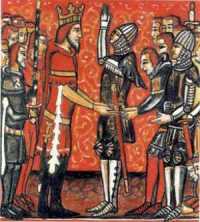 How Christianity Was Used to Enslave Europe
How Christianity Was Used to Enslave Europe
When I speak with Christians, many describe the spiritual growth their relationship with Jesus has given them. I know they are sincere but I always wonder how they would feel about Jesus if they were forced to take an Oath of Fealty to his earthly representative.
A 7th century Anglo-Saxon “Oath of Fealty” between a serf and his lord still exists. It states: “By the Lord before whom this sanctuary is holy, I will be true and faithful, and love all which he loves and shun all which he shuns, according to the laws of God and the order of the world. Nor will I ever with will or action, through word or deed, do anything which is unpleasing to him, on condition that he will hold to me as I shall deserve it, and that he will perform everything as it was in our agreement when I submitted myself to him and chose his will.”
 Christianity may be considered a religion, but it was actually developed and used as a system of mind control to produce slaves that believe God decreed their slavery. From their position as the “Pontifex Maximus” – the official title for Caesar’s position as head of the pagan college of Roman priests – the Pontiffs of the Roman Catholic Church oversaw the feudal system wherein Christianized serfs gave their work product to the authorities without complaint. Their docility was caused by the fact that they were Christians and therefore believed the Apostle Paul when he wrote: “slaves should be obedient to their masters in everything”. (Titus, 2)
Christianity may be considered a religion, but it was actually developed and used as a system of mind control to produce slaves that believe God decreed their slavery. From their position as the “Pontifex Maximus” – the official title for Caesar’s position as head of the pagan college of Roman priests – the Pontiffs of the Roman Catholic Church oversaw the feudal system wherein Christianized serfs gave their work product to the authorities without complaint. Their docility was caused by the fact that they were Christians and therefore believed the Apostle Paul when he wrote: “slaves should be obedient to their masters in everything”. (Titus, 2)
Though serfs were indeed slaves – the word “serf” can be traced back to the Latin word servus, meaning “slave” – the group that became serfs did not start out as slaves and were originally called coloni (sing. colonus), a Latin word meaning a farmer who farmed his own land. (One interesting etymological point is that the word “colonized” was first used to depict a colonus changing wild land into farm land.)
When Rome was a Republic the coloni had numerous rights including the ability to sell their land, but these freedoms steadily eroded during the imperial era. Around 300 CE the Caesar Diocletian implemented a tax that unified a plot of land with its inhabitants. It thereby became more difficult for coloni to sell their plots.
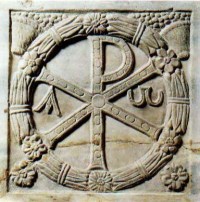 In 306 CE, upon the death of his father Constantius, Constantine became co-Emperor with his brother-in-law Maxentius. The two were bitter rivals however, and war soon broke out. Before the battle of the Milvian Bridge in 312 CE, Constantine had his famous but absurd vision in which Christ purportedly instructed him to place a particular sign on the battle standards of his army. This symbol was called the Chi Rho (the Chi Rho superimposed the first two letters of the Greek word “ΧΡΙΣΤΟΣ” or Christ in such a way to produce a monogram that invoked the crucifixion of Jesus) and was described by Eusebiusas “a long spear, overlaid with gold, which included a bar crossing the spear to form the shape of the Christian cross. On the top of the whole was fixed a wreath of gold and precious stones, and within this the symbol of the Savior’s name, two letters indicating the name of Christ by means of the initial letters, the letter X intersection P at the center.” Included with the banner were the words: “In hoc signo vinces” (in this sign thou shalt conquer).
In 306 CE, upon the death of his father Constantius, Constantine became co-Emperor with his brother-in-law Maxentius. The two were bitter rivals however, and war soon broke out. Before the battle of the Milvian Bridge in 312 CE, Constantine had his famous but absurd vision in which Christ purportedly instructed him to place a particular sign on the battle standards of his army. This symbol was called the Chi Rho (the Chi Rho superimposed the first two letters of the Greek word “ΧΡΙΣΤΟΣ” or Christ in such a way to produce a monogram that invoked the crucifixion of Jesus) and was described by Eusebiusas “a long spear, overlaid with gold, which included a bar crossing the spear to form the shape of the Christian cross. On the top of the whole was fixed a wreath of gold and precious stones, and within this the symbol of the Savior’s name, two letters indicating the name of Christ by means of the initial letters, the letter X intersection P at the center.” Included with the banner were the words: “In hoc signo vinces” (in this sign thou shalt conquer).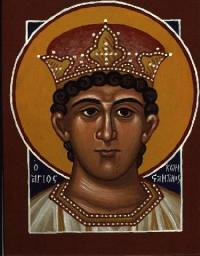 Armed with the “power of Jesus”, Constantine defeated his rival and became dictator. His reign is best remembered for the Edict of Milan in 313, which fully legalized Christianity, and the Council of Nicea, which he chaired in 325, that began the era where the religion enjoyed the power of the Roman state.
Armed with the “power of Jesus”, Constantine defeated his rival and became dictator. His reign is best remembered for the Edict of Milan in 313, which fully legalized Christianity, and the Council of Nicea, which he chaired in 325, that began the era where the religion enjoyed the power of the Roman state.
Because of his assistance in making Christianity the state religion, Constantine enjoys a positive historical legacy. In fact he was among the most wicked men in history [emphasis ours]. What has been overlooked by historians is that his efforts on behalf of Christianity were just one half of his legal “reforms” and when one half is juxtaposed to the other an entirely different picture emerges. Constantine used Christianity to make the enslavement of most of the European population acceptable to the victims because it was an act of God.
Constantine’s other edicts were the true beginning of medieval serfdom. They officially ended the coloni’s ability to sell their land but bound them to it forever. Another set of edicts forbade the lower classes from changing profession. Constantine thereby froze an unfair society into place. And to prevent any intellectual resistance from the newly created slaves, Constantine also began the process that made Christianity the state religion. When viewed in their true historical context, it is self-evident that the sole purpose for the specific combination of Constantine’s edicts was to enslave serfs and make rebellion a sin.
Below is the order of rank that Constantine’s edicts created – the Feudal System :
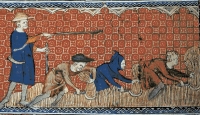 Eventually the degradation of the coloni’s legal status to serf was formalized with the creation of a ceremony known as “bondage”. During the ceremony a serf placed his head in the lord’s hands – akin to the ceremony where a vassal placed his hands between those of his overlord. The serf would then swear oaths that bound him to his lord in a feudal contract which defined the terms of his slavery. Thus, the Oath of Fealty, which still exists to this day, producing an attitude of servitude in those who willingly submit to the authority structure. - Joseph Atwill’s Blog, 24 October 2013
Eventually the degradation of the coloni’s legal status to serf was formalized with the creation of a ceremony known as “bondage”. During the ceremony a serf placed his head in the lord’s hands – akin to the ceremony where a vassal placed his hands between those of his overlord. The serf would then swear oaths that bound him to his lord in a feudal contract which defined the terms of his slavery. Thus, the Oath of Fealty, which still exists to this day, producing an attitude of servitude in those who willingly submit to the authority structure. - Joseph Atwill’s Blog, 24 October 2013
 An Aside: How Saul became Paul - Joseph Atwill
An Aside: How Saul became Paul - Joseph Atwill
My upcoming work The Single Strandexplains the mysterious NT character ‘Paul’. The first mystery concerning Paul is why did the author of Acts change his name from ‘Saul’ to ‘Paul’, a word that means ‘tiny’. The truth behind Saul’s nickname is vicious humor that makes fun of the fact that Paul was not merely circumcised but castrated. The story of Paul’s castration is black comedy and is given in Acts 13 1-9.
Prior to the scene in Acts 13 Saul/Paul had attacked a member of the ‘way’ – Stephan – who has been preaching for ‘Jesus’, in other words, Stephan had been preaching for the Flavian Christ. Following this event Saul shows up in Antioch with a group that includes a ‘stepbrother’ of Herod. Then the ‘Holy Spirit’, for some reason, orders Saul ‘separated’ – the Greek word used can also mean ‘severed’ – and the group then “placed their hands on him” – the word used for “placed” can also mean ‘attack’. Following the event Saul becomes ‘Paul’, a word that means ‘tiny’. In other words, Paul has been ‘severed’ – or castrated – by the group led by Herod’s ‘stepbrother’ as revenge for his participation in the attack on a member of the ‘Way’ – the Caesars’ version of Judaism. This was how Saul became ‘Tiny’.
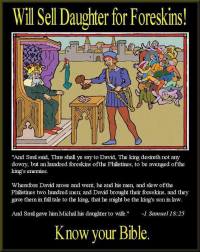 To digress, this analysis shows not only the reason why the Romans named the character ‘Paul’, but why they gave him his original name of ‘Saul’. Saul was the Jewish king that had demanded David obtain ‘a hundred Gentile foreskins’ and the Romans named their character ‘Saul’ to imply that his ‘circumcision’ involved – like the one ordered by his OT ‘forerunner’ – more than a single foreskin. The author of Acts‘clarifies’ the relationship by actually mentioning the OT Saul in the passage where ‘Saul’ becomes ‘Tiny’ – Acts 13:21. The author also notes that the OT Saul’s reign had the space of forty years. This ‘foresees’ the forty years between the beginning of Paul’s ‘ministry’ at approximately 40 CE and the start of Domitian’s reign in 81 CE – a roughly forty-year cycle parallel to the one which linked Jesus toTitus.
To digress, this analysis shows not only the reason why the Romans named the character ‘Paul’, but why they gave him his original name of ‘Saul’. Saul was the Jewish king that had demanded David obtain ‘a hundred Gentile foreskins’ and the Romans named their character ‘Saul’ to imply that his ‘circumcision’ involved – like the one ordered by his OT ‘forerunner’ – more than a single foreskin. The author of Acts‘clarifies’ the relationship by actually mentioning the OT Saul in the passage where ‘Saul’ becomes ‘Tiny’ – Acts 13:21. The author also notes that the OT Saul’s reign had the space of forty years. This ‘foresees’ the forty years between the beginning of Paul’s ‘ministry’ at approximately 40 CE and the start of Domitian’s reign in 81 CE – a roughly forty-year cycle parallel to the one which linked Jesus toTitus.
This analysis enables the real nature of ‘Paul’ to be understood. Paul begins as ‘Saul’, a messianic rebel fighting against the ‘Way’, which is the Flavians’ Christ cult, but has an epiphany and is ‘converted’ to belief in ‘Christ Jesus’, in other words he understands that Caesar is the Christ. - Joseph Atwill’s Blog, 9 April 2013
No comments:
Post a Comment